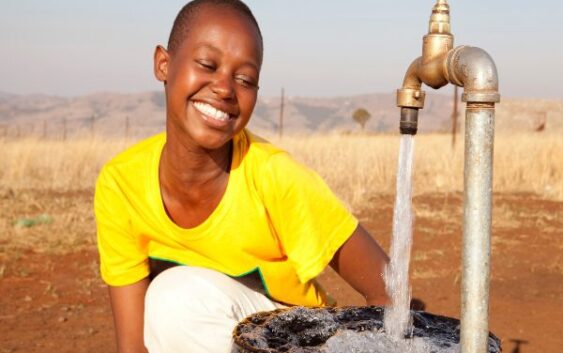- WORLD BANK KICK-OFF INSPECTION OF USMID PROGRAM IN UGANDA
- ALGERIA MINISTER RECIEVED HARBOR ENERGY CEO OVER ENERGY PARTNERSHIP
- CAN INNOVATION OUTRUN DROUGTH IN MOROCCO ONGOING WATER MANAGEMENT CRISIS
- SCZONE SIGNED DEAL WITH CHINESE INVESTORS FOR IRON PRODUCTS PROJECTS IN EGYPT
- WESTPROP HOLDING LIMITED SET TO EMBARKED ON PIPELINE PROJECT IN ZIMBABWE
HOW PLANNING FOR SOUTH AFRICA WATER FUTURE BEGINS TODAY

The year 2022 was an extraordinarily difficult one for the KwaZulu-Natal. Floods ravaged the province in April of that year, leaving in its wake a trail of death and destruction.
While Mhlathuze Water did not experience any major disturbances to its water infrastructure during the floods, they are not immune to the threats of climate change. The threats posed by climate change compel water utilities to act decisively and mitigate its effects. Approaches to infrastructure planning must change to adapt and minimize the effects of climate change.
Climate change manifests itself in a variety of forms, the north of KwaZulu-Natal found itself faced with one of the severest droughts in 2015, which exposed how ill-prepared the province was for the tectonic shifts in weather patterns.
In both these cited instances, an important lesson for Mhlathuze Water is that all plans for future water security must consider the myriad effects of climate change – ranging from water scarcity to extreme rains.
Development of a Bulk Water and Wastewater Infrastructure Plan
Mhlathuze Water has developed a Bulk Water and Wastewater Infrastructure Plan that makes provision for lower bulk water and related services for industries and communities.
This plan provides an integrated overview of all actions, initiatives, and projects that effectively meet current and future bulk water and wastewater demands. The plan also makes provisions for water reserves to accommodate the growth forecasts of industries and communities.
The 2040 Reconciliation Strategy for the Richards Bay growth node is also expressed in the plan, as well as the actions that need to be taken over the next 20 years in anticipation of these projections.
Furthermore, the Board of Mhlathuze Water has approved a sum of R21 million for three feasibility studies that are critical to future water security.
Abstraction from the Tugela River (Mandeni)
The Thukela River holds massive promise for expanded water provision in the north of KwaZulu-Natal. Provided this system is adequately developed, the anticipated growth in demand for both residential and industrial water in the northern corridor of the province will be met and surpassed.
In anticipation of this boom in demand, from as far back as 2005, Mhlathuze Water secured a water use license to develop infrastructure on the Thukela River, allowing it to churn 47.3 million mega liters of water per annum.
Through this development, the intention would be to transfer the abstraction license to Tugela-Goedertrouw Transfer Scheme by increasing the water being transferred from the Goedertrouw to the Mhlathuze River. This would enable Mhlathuze Water to meet future demand and business development initiatives by relieving pressure on the Mhlathuze Weir Supply system as well as adding a leading raw water source.
Desalination of seawater
Lessons from the droughts seven years ago brought into sharper focus the need to explore alternative water sources. Mhlatuze’s master plan recommends a feasibility study into the desalination of water. Ultimately, depending on the outcomes of the study, the intention is to construct a desalination plant to support the current water resources in use in Richards Bay and the surrounding areas.
Infrastructure development for economic growth and job creation
Due to its location, Mhlatuze Water makes plans in tandem with the Richards Bay Industrial Development Zone (RBIDZ). The RBIDZ Phase 1F Water Supply and Effluent Disposal has been developed to assist a mega industrial development by Nyanza Light Metals.
The R5-billion development Nyanza Light Metals will require Mhlathuze Water to provide effluent disposal infrastructure to dispose of approximately 872 m3/hr with (20.9 Mℓ/d) of brine-containing gypsum suspended solids.
Previous experience in handling large volumes of effluent for industries like Foskor means that Mhlatuze Water is more than equal to this task. This development will be a major injection into the economy of KwaZulu-Natal and will result in the creation of much-needed jobs in the Richards Bay region.
Equitable access to water for social transformation
Mhlathuze Water must respond to the directive by the 2030 National Development Plan (NDP) to water institutions to act as enablers for water provision. The NDP calls for municipalities and water boards to ensure that the use of water is equitable; that citizens and all stakeholders are represented in issues of water governance and thirdly, and that decent water and sanitation services are available for all South Africans.
In pursuit of this objective, over the past financial year, the Minister of Water and Sanitation, Minister Senzo Mchunu, issued a Section 63 to Mhlathuze Water to provide intervention and complete the restoration of water projects in the uMkhanyakude District to provide water to households.
There are advanced plans to execute this mandate within the shortest possible period. With these infrastructure upgrades, Mhlathuze Water will work closely with the uMkhanyakude District so that locals benefit from the job and economic opportunities that will accrue.
Looking ahead, the utility remains poised to play a central role in the growth of the fortunes of KwaZulu-Natal and to make a meaningful difference in the lives of people.
SOURCE: InfrastructureNews

